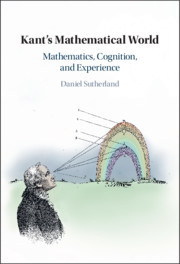Description
Kant's Mathematical World
Mathematics, Cognition, and Experience
Author: Sutherland Daniel
Language: English
Subject for Kant's Mathematical World:
Publication date: 10-2021
300 p. · 15.7x23.5 cm · Hardback
300 p. · 15.7x23.5 cm · Hardback
Description
/li>Contents
/li>Biography
/li>
Kant's Mathematical World aims to transform our understanding of Kant's philosophy of mathematics and his account of the mathematical character of the world. Daniel Sutherland reconstructs Kant's project of explaining both mathematical cognition and our cognition of the world in terms of our most basic cognitive capacities. He situates Kant in a long mathematical tradition with roots in Euclid's Elements, and thereby recovers the very different way of thinking about mathematics which existed prior to its 'arithmetization' in the nineteenth century. He shows that Kant thought of mathematics as a science of magnitudes and their measurement, and all objects of experience as extensive magnitudes whose real properties have intensive magnitudes, thus tying mathematics directly to the world. His book will appeal to anyone interested in Kant's critical philosophy -- either his account of the world of experience, or his philosophy of mathematics, or how the two inform each other.
Preface and acknowledgements; 1. Introduction: mathematics and the world of experience; Part I. Mathematics, Magnitudes and the Conditions of Experience: 2. Space, time and mathematics in the Critique of Pure Reason; 3. Magnitudes, mathematics, and experience in the Axioms of Intuition; 4. Extensive and intensive magnitudes and continuity; 5. Conceptual and intuitive representation: singularity, continuity, and concreteness; Interlude: the Greek mathematical tradition as background to Kant: 6. Euclid, the Euclidean mathematical tradition, and the theory of magnitudes; Part II. Kant's Theory of Magnitudes and the Role of Intuition: 7. Kant's reworking of the theory of magnitudes; 8. Kant's reformation of the metaphysics of quantity; 9. From mereology to mathematics; 10. Concluding remarks; Bibliography; Index.
Daniel Sutherland is Associate Professor of Philosophy at the University of Illinois at Chicago. He has published numerous articles on Kant's philosophy of mathematics and science, including their relation to Euclid, Newton, Leibniz, Frege, and others.
© 2024 LAVOISIER S.A.S.




